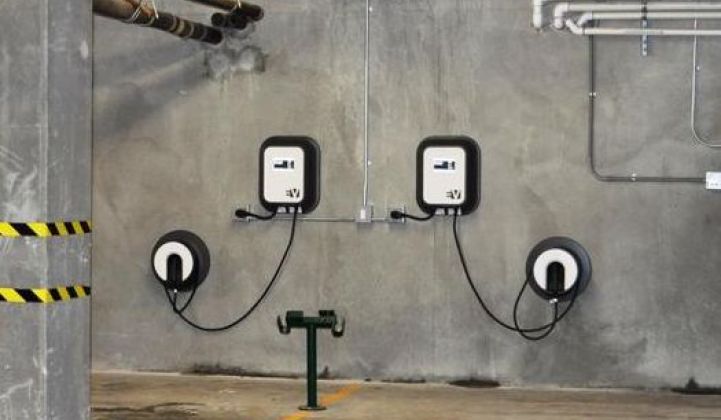Looks like the new owner of bankrupt ECOtality’s Blink electric vehicle charging network will have an uphill battle in convincing the public that the brand is worth sticking with for the long haul.
On Thursday, Miami-based EV charging provider Car Charging Group announced that it had won a bid to purchase the Blink-related assets of ECOtality, including its more than 12,450 Level 2 charging stations, its 110 DC fast-charging stations, and the underlying network that supports them.
Those residential and public chargers were rolled out across the United States via more than $100 million in Department of Energy grants, as part of the DOE’s EV Project. But ECOtality’s most recent financial reports revealed its near-total inability to build a business that could survive beyond the completion of that project, which led to the DOE freezing further grant payments and to ECOtality’s bankruptcy protection filing last month.
Meanwhile, reports of Blink chargers overheating and damaging cars, public chargers that don’t work, home-charging customers stranded without support, and other bad news have been rolling in. Now, the results of a survey of 457 Blink users conducted by Recargo, a startup with technology to link EV drivers to publicly available charging stations via smartphone apps, indicate the depths of Blink’s public branding problems.
According to the survey, only 48 percent considered the Blink brand “reliable” and only 18 percent said they felt “loyal” to the brand. By comparison, survey respondents gave a 78-percent reliability score to ChargePoint, the California startup that has the most publicly available EV charging stations deployed in the country.
Even worse for Blink is its ranking on a commonly used brand satisfaction score, known as the Net Promoter Score, which compares the number of people who say they’re likely to recommend the brand to friends and family to those who say they’re likely to warn people away from it. Blink’s NPS rang in at a dismal -11, meaning that detractors far outweigh promoters.
Car Charging Group does have experience putting together disparate corporate EV charging networks. In mid-2012, it bought rival 350Green, bringing its total public charging points to more than 1,000 across the country. At the same time, the company has been reporting increasing losses over the past four quarters, and its share price in over-the-counter trading stood at just 90 cents as of Friday morning, down from a 52-week high of $2 -- facts that are unlikely to give Blink customers much additional confidence.
ECOtality listed $38.9 million in assets and $108.2 million in liabilities in an Oct. 1 bankruptcy court filing (PDF). While Car Charging Group didn’t disclose its purchase price for ECOtality’s Blink assets, news reports cite Dow Jones as stating that the Car Charging subsidiary Blink Acquisitions bid $3.3 million for the assets.
Those reports also note that ECOtality’s industrial charging subsidiary Minit Charger was acquired by Access Control Group for $250,000, and that its ETEC Labs research arm was bought by Intertek for $750,000, bringing the defunct company’s total bid price to $4.3 million.
All told, it’s hard to see how Car Charging Group will manage to bring ECOtality’s struggling technical and business operations up to speed in a way that can keep its Blink charging systems from falling into the dreaded category of stranded assets. Certainly, local governments and businesses that have invested their own money, time and reputations in hosting Blink chargers will be watching closely and keeping their fingers crossed.



